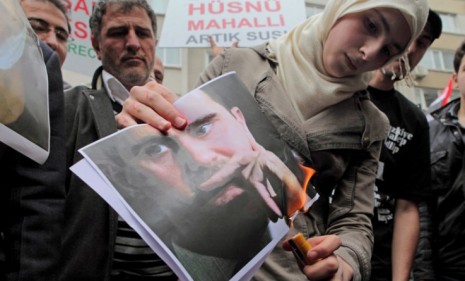Can a 'general amnesty' save Syria's Assad?
Syria's embattled president pardons his political opponents in a new bid to cool protesters' anger. But is it already too late for Assad?

A free daily email with the biggest news stories of the day – and the best features from TheWeek.com
You are now subscribed
Your newsletter sign-up was successful
Syrian President Bashar al-Assad has issued a general pardon for all crimes committed before May 31 — the latest attempt to appease anti-government protesters. But opposition leaders say the amnesty is "too little, too late," especially since it followed a military crackdown that human rights groups say has killed more than 1,000 civilians. If anything, public anger has risen in recent days, after security services returned the horribly mutilated body of 13-year-old Hamza al-Khatib to his family. At this point, can granting a general amnesty — or any other reform — save the Assad regime? (Watch an Al Jazeera report about Assad's pardon.)
Assad has gone too far: "I simply do not know how the brutal torture of children can be surpassed as an example of pure evil," says Andrew Sullivan at The Daily Beast. Assad's cruelty is "morally intolerable, even under the standards of the Middle East." There is little the West can do to help, militarily or economically, but we can express our support for Assad's victims while they fight to get rid of him themselves.
The Week
Escape your echo chamber. Get the facts behind the news, plus analysis from multiple perspectives.

Sign up for The Week's Free Newsletters
From our morning news briefing to a weekly Good News Newsletter, get the best of The Week delivered directly to your inbox.
From our morning news briefing to a weekly Good News Newsletter, get the best of The Week delivered directly to your inbox.
The military, not reforms, is saving Assad: The Syrian army's loyalty to Assad has kept his regime secure, says security analyst Timur Gksel, as quoted by the Financial Times. Assad's brother commands the Fourth Armored Division, the military's backbone, so there's no reason to believe he'll lose his soldiers anytime soon. "The army command remains rigid, unified and strong." And with nine mechanized divisions, two special forces units, and his intelligence services, Assad has the resources to broaden his crackdown if he chooses.
"Military loyalty to Assad stems from clans"
Assad can't stop change now: Assad and his security chiefs can continue to impose the rule of their Alawite minority over the predominantly Sunni protesters, says Fareed Zakaria at CNN, but that will only postpone the inevitable fall of his regime. His only alternative is enacting "deep political reforms that could convince the protesters to return home but would end the Alawite-led system on which he so heavily relies." Either way, the Assad regime as it existed before the protests is history.
"Washington should plan for a post-Assad Syria"
A free daily email with the biggest news stories of the day – and the best features from TheWeek.com
-
 How Democrats are turning DOJ lemons into partisan lemonade
How Democrats are turning DOJ lemons into partisan lemonadeTODAY’S BIG QUESTION As the Trump administration continues to try — and fail — at indicting its political enemies, Democratic lawmakers have begun seizing the moment for themselves
-
 ICE’s new targets post-Minnesota retreat
ICE’s new targets post-Minnesota retreatIn the Spotlight Several cities are reportedly on ICE’s list for immigration crackdowns
-
 ‘Those rights don’t exist to protect criminals’
‘Those rights don’t exist to protect criminals’Instant Opinion Opinion, comment and editorials of the day